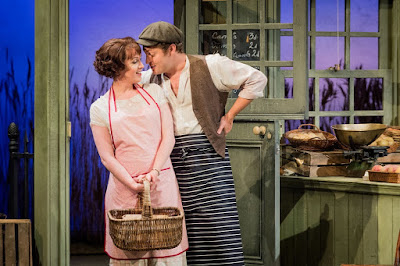 |
| Britten: Albert Herring - The Grange Festival - Kitty Whately, Richard Pinkstone, Adrian Thompson (photo Robert Workman) |
Reviewed by Robert Hugill on June 25 2017
Star rating:
A real comedy of character, strong characterisations depicted with affectionate warmth
 |
| Orla Boylan (photo Robert Workman) |
John Copley took a traditional view of the opera, an early 20th century setting with acutely observed detail and a sense of vivid theatre, Copley introduced no directorial pensées and concentrated on created a real comedy of character with a poignant sense of seriousness of purpose at its heart.
We opened in Lady Billows' (Orla Boylan) neo-Gothic mansion down-stage, and for the scene change to the greengrocers shop, members of the Grange Festival's ensemble (dressed as servants) changed the scene before our eyes. For each of the scene changes, Copley and Reed grasped the theatre's limited technical facilities as a virtue and gave us virtuoso moments of stagecraft. The act two change from the marquee to the greengrocers was particularly notable.
 |
| Kitty Whately, Timothy Nelson (photo Robert Workman) |
Also central to the opera, of course, is the character of Lady Billows. Orla Boylan, fresh from her performances in the title role of Turandot with Opera North, brought a powerful yet subtle vocal instrument to bear on a role which was written for just such voice (the first Lady Billows, Joan Cross, was a notable Sieglinde and Marschallin). But what was really remarkable was the physical transformation, Boylan really incarnated the old battle-axe, elderly and not walking well (and using this as a weapon). Boylan looked and sounded perfectly in character, and only escaped when, halfway across the stage to take her bow, she suddenly changed from Lady Billows back to Orla Boylan. This Lady Billows was not quite as vicious as some, but was constantly dissatisfied and disappointed with life, with a wonderful array of facial expressions commenting on the activity around her. Recent performances of the opera have seen the character (and its vocal qualities) re-invented somewhat, and it was lovely to see (and hear) Lady Billows returning to Britten's original conception in such a brilliantly theatrical manner.
The rest of the village worthies were a fine mixture of youth and experience, each creating a strongly etched character. Clarissa Meek was a deceptively quiet, down-trodden Florence Pike who showed her real character when in the second scene she relished the amazing array of village gossip about the failed virgins. Alexander Robin-Baker was a cherubic-faced Mr Gedge, hiding sententiousness and an unhealthy interest in Miss Wordsworth. Adrian Thompson's Mr Upfold was familiar from other productions, but welcome nonetheless. Anna Gillingham made a charming Miss Upfold, taking the character at face value and making her dim nature notes seem delightful. Andri Bjorn Robertsson was a characterful Superintendent Budd, a bit dim and obsessive about detail.
To these we must add Albert's mother, Mrs Herring. Kathleen Wilkinson played her as slightly more demure than usual, her treatment of Albert had less overt comedy about it and Mrs Herring's grief in Act Three was entirely serious (I can remember other productions where this is made very, very funny). Though the worthies were all strongly etched characters, they were people too and in Act Three their reaction to Albert's death was entirely serious to that the opening scenes had a poignant note of grief about them, with the comedy coming from Albert's re-entry rather than the worthies' behaviour.
Contrasted with these were the younger people, who encouraged Albert on. Kitty Whately was a delight as ever as Nancy, singing with warm tones but not without sharpness when Sid needed to be controlled and perhaps appreciating that Albert finds her attractive too. Timothy Nelson was a warmly sympathetic Sid, a trifle less bumptious than usual and with some beautifully sung moments. His Act Three description of the bustle in the village was finely done, whilst Nelson and Whately really joined together to create a believable couple.
The children were also vividly etched, with each Catriona Hewitson, Emily Vine and Jack Stone, relishing the small solos Britten gives the characters, as well as the vivid comedy of the rehearsal scene with Miss Worthsworth in Act Two.
 |
| Britten: Albert Herring - The Grange Festival - Adrian Thompson, Clarissa Meek, Richard Pinkstone, Orla Boylan(photo Robert Workman) |
In the pit Steuart Bedford paced the opera admirably, and drew vivid playing from the members of the Aurora Orchestra. Though the piece only uses 13 instruments, there was nothing reduced about the effect that Bedford and his players created. And the instrumental interludes were particularly fine.
This was a notable achievement, full of strong characters affectionately drawn and working together to create a superb ensemble piece, with very high musical values. The production runs until 7 July 2017, but I do hope that we see it again.
Elsewhere on this blog:
- Vividly theatrical: Monteverdi's Il ritorno d'Ulisse at the Grange Festival - Opera review
- Remarkable ensemble: Janacek's Jenufa at Grange Park Opera - Opera review
- Someone once suggested she take a choral contraceptive! I chat to conductor Suzi Digby - interview
- A very complete performance: Don Giovanni from Opera Holland Park Young Artists - Opera review
- Bach orchestral suites: Robert King and the King's Consort - concert review
- From Border-Ballads to Carlyle's Centenary: Christopher Guild plays Ronald Stevenson - CD review
- Bach re-imagines Bach: William Carter in Bach's lute music - CD review
- End of an era: The final Rosenblatt Recital - concert review
- Thrilling: Beethoven's Leonore at Dresden Music Festival - Opera review
- Martin Luther in words & music: Flautando Köln & Stefan Bauer at Dresden Music Festival - concert review
- Home



.jpg)






No comments:
Post a Comment